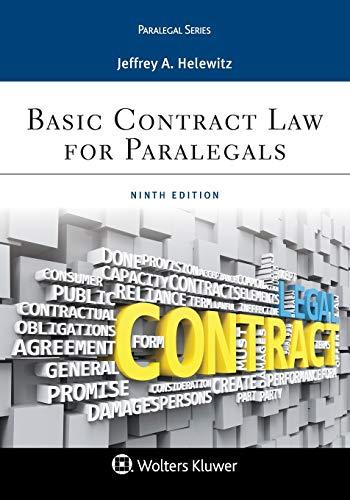Defendants defaulted on a promissory note that was given to Plaintiffs as part of the purchase price
Question:
Defendants defaulted on a promissory note that was given to Plaintiffs as part of the purchase price for a nine-acre lot, and Plaintiffs sued to enforce the note. Defendants claim ‘‘frustration of purpose’’ excuses them from making further payments on the note because newly-enacted wetlands regulations prevented them from developing the land as a business park. Both the trial court and the Court of Appeals granted summary judgment for Plaintiffs. We affirm.
Plaintiffs Dona and Charles Felt owned a nine-acre lot, which was dissected in the middle by the North Creek. The lot was zoned Rural Conservation, but the North Creek Comprehensive Plan designated the land as Business Park. Other properties in the immediate area had already been rezoned as Business Park, and there were completed and ongoing business developments on some of those neighboring properties.
In 1983, Thomas C. McCarthy and Ronald F. Tasso, who is not a party to this case, began gathering adjoining parcels of property in Snohomish County for the purpose of developing a business park. McCarthy approached the Felts to discuss his plan for developing a business park. In 1983 McCarthy and Tasso obtained an option agreement from the Felts to purchase the nine acres for $260,000. In the agreement, the Felts promised to help McCarthy and Tasso rezone the property to Business Park, and McCarthy and Tasso agreed to pay all costs associated with the rezone application.
McCarthy and Tasso applied to rezone 123 acres including the Felt property. In November 1985, the rezone application was denied without prejudice because McCarthy and Tasso held ownership interests in only 47 of the 123 acres.
Even though they failed to rezone the property, McCarthy and Tasso purchased the nine acres from the Felts in December 1986. The purchase price was $310,000. Part of the price was met by an $80,000 down payment, and McCarthy and Tasso each gave an unsecured promissory note for
$89,627.84. The purchasers satisfied the remainder of the purchase price by assuming an old mortgage on the Felt property, paying closing costs, and receiving credit for option fees previously paid to the Felts. The Felts conveyed the property to McCarthy and Tasso by statutory warranty deed, and the Felts retained no interest in the land whatsoever. The sales contract placed no conditions on the sale.
In a transaction related to their purchase of the Felt property, McCarthy and Tasso borrowed $122,800 from Harry H. Olson, Inc. The lender obtained a deed of trust for the Felt property as security for this loan.
In January 1987, the Army Corps of Engineers released its Wetlands Delineation Manual. Soon thereafter, Snohomish County adopted several motions to protect wetlands. Although it was not immediately clear how these regulations affected the Felt property, by November 1990 McCarthy learned that the regulations rendered the Felt acreage useful only as a single homesite or as open space. In the trial court, McCarthy submitted a declaration from a real estate broker who set the estimated value of the Felt property at only $50,000 as a result of the wetlands regulations. Plaintiffs never contested this estimate.
Even before they were aware of the wetlands restrictions on the Felt property, McCarthy and Tasso defaulted on the loan repayments to Harry H.
Olson, Inc. for the $122,800 loan which was secured by the Felt property. A notice of default was mailed to McCarthy and Tasso on May 24, 1988. On January 25, 1991, McCarthy and Tasso still had not cured the default, so the property was foreclosed and sold at public auction. According to the trustee’s deed, the Felt property was sold for the sum of $240,338.30, in complete satisfaction of McCarthy’s and Tasso’s obligations under the original loan from Harry H. Olson, Inc.
Soon after the Felt property was sold in foreclosure, McCarthy defaulted on the promissory note held by the Felts. Dona Felt and the representative of her deceased husband’s estate brought an action against McCarthy and his wife to collect the unpaid portion of the promissory note, plus interest and attorney fees. Tasso’s note was not involved in the case. McCarthy raised the affirmative defense of commercial frustration, or frustration of purpose, and argued the court should excuse all unpaid portions of the note since the property was worth only $50,000. The trial court granted summary judgment for the Felts. The Court of Appeals found the frustration of purpose doctrine was not applicable to the facts of the case and affirmed the trial court. Felt v.
McCarthy, 78 Wn. App. 362, 898 P.2d 315 (1995), review granted, 128 Wn.2d 1011 (1996). We also affirm.
McCarthy’s frustration argument is fatally flawed. He claims his plans to develop a business park were frustrated by wetlands regulations. The facts show that McCarthy’s plans were not frustrated by wetlands regulations; they were frustrated by his failure to repay the loan obtained from Harry H. Olson, Inc. McCarthy’s first default on the loan payments occurred in 1988, two years before McCarthy even learned about the impact of the wetlands regulations on the Felt property. Nonetheless, because this court is reviewing a summary judgment favoring Plaintiffs, the facts should be considered in the light most favorable to the nonmoving party. Degel v. Majestic Mobile Manor, Inc., 129 Wn.2d 43, 48, 914 P.2d 728 (1996). We will assume that wetlands regulations effectively prevented McCarthy from developing the business park.......
Questions
1. How does the court define the concept of frustration of purpose?
2. What was the effect of the decline in the market value of the property on the court’s determination? Why?
3. Create a scenario in which a contract could be discharged by frustration of purpose.
Step by Step Answer:






